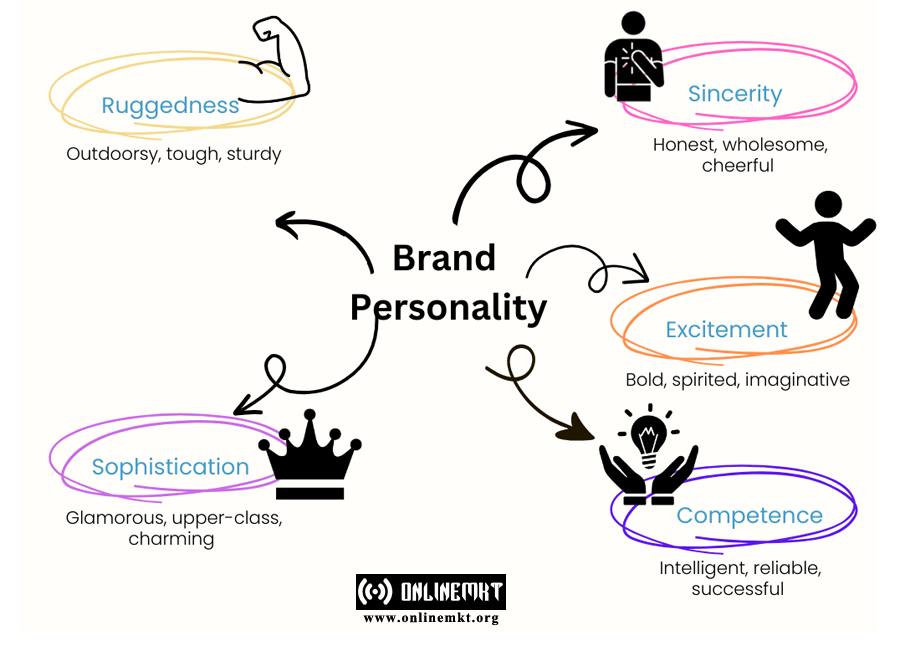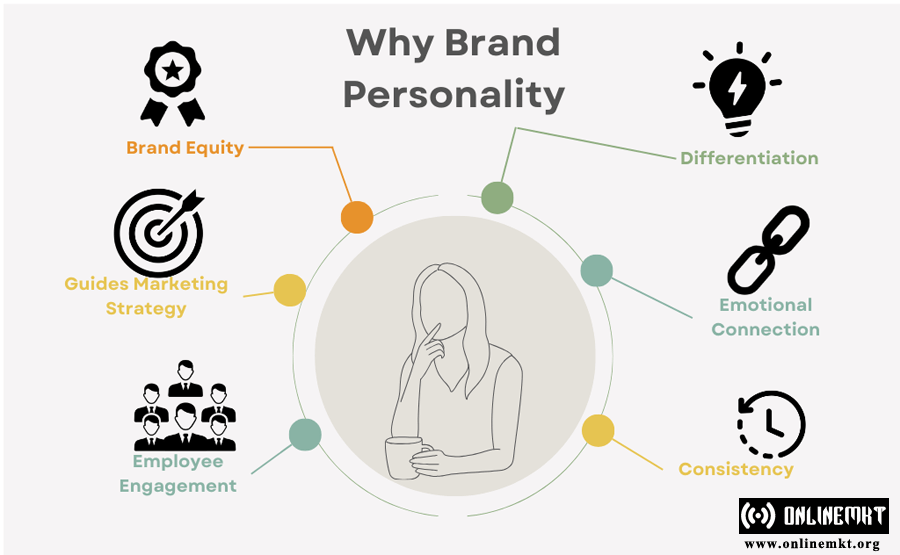Brand Personality

Transform your brand from forgettable to unforgettable with the power of a compelling brand personality.
Brand personality is the set of human characteristics that are attributed to a brand in order to make it more personable and easier to remember for the target customer.
Establishing a brand personality is more a matter of standing out from the crowd than being liked. Creating a differentiation personality makes you an individual character who gets remembered.
For example, a friendly and fun brand can use humor and casualness to interact with consumers. A professional brand can emphasize accuracy and expertise instead. By taking on the personality of a particular kind, you create a consistent brand voice that grabs your audience and shines in a crowded marketplace.
The Aaker Model: Five Dimensions of Brand Personality
Marketing professor Jennifer Aaker proposed a model of brand personality on five dimensions:
Sincerity
Sincerity is one of the core elements of brand personality, and every brand tries to utilize it with the purpose of adding value to it. Sincerity ought to be the goal of only those brands that are sincere, friendly, and modest.
Sincere brands show consumers their social beliefs and ethical behaviors. Some of the brands that have sincerity include food, safety, and hospitality brands. Campbell’s Soup and Hallmark are some of the best examples.
Excitement
Brands that have an excitement attribute are those that are appealing to the younger generation. They are dynamic, adventurous, and creative, and they tend to sponsor major music festivals and sporting competitions.
Their ad agencies sell them as edgy companies that excite and inspire customers. Some of the edgy brands include TikTok, Pepsi, Monster Energy, Nike, and Vice.
Competence
Successful brands are capable, smart, and reliable and they dominate the categories. The brands are known and trusted to be experts and pillars of reliability. Customers perceive a brand as successful due to its deed and performance in society.
Sophistication
Sophistication entails high-end, charismatic brands for high-end and sophisticated customers. Apple is a good example which emphases on technological advancement and surprising consumers with high-end products.
Since the return of Steve Jobs in the late 1990s, Apple prioritized design. Apple products, packaging, advertising, and software are all high-end. This characteristic is high-end, sophisticated, high-class, ageless, and glamorous.
Ruggedness
Rugged brands embody toughness, strength, and an outdoor lifestyle. They use bold language and strong graphics to speak to people who crave exciting experiences. Examples include Jeep and The North Face.
Why Brand Personality

Differentiation
By instilling qualities such as sincerity, passion, sophistication, or ruggedness, brands can engage with consumers on a more profound emotional level. That emotional link sets them apart from the competition that offers the same kind of products or services but without their own personality
Emotional Connection
Brand personality facilitates emotional identification with customers by humanizing the brand and making it easier to relate to. When a brand displays traits and values that consumers see in themselves, they develop a sense of familiarity and understanding.
Consistency
Brand personality assists with consistency to consumers by providing a coherent and consistent experience in every encounter. If the personality of a brand is consistent, consumers know what they should expect, and the brand is more reliable and trustworthy. That kind of consistency provides customers assurance that they can rely on the brand to produce products, services, and experiences that reflect their values and expectations.
Employee Engagement
A robust brand personality helps in the development of a stable organizational culture in which the employees feel a sense of belongingness and purpose. When the employees observe the personality of the brand and are encouraged to embody it in their jobs, they become ambassadors of the brand who convey the values of the brand through authentic means to the customers.
This kind of authenticity creates customer trust and loyalty since they feel cared for and committed to by the employees who embody brand personality characteristics. Finally, employee engagement around brand personality enhances customer experience, good work environment, and company performance.
Guides Marketing Strategy
Brand personality guides messaging and communications efforts so that marketers can develop engaging stories and experiences. To be a strong brand personality through advertising, social media, or experiences is to be consistent in representation and consumer perception.
Brand Equity
A strong and established brand personality develops overall brand equity. It provides intangible value, which makes the brand more desirable and influential in the marketplace.
Conclusion
Brand personality, whether it is sincerity, excitement, sophistication, or ruggedness, humanizes and makes brands credible to customers. Sincerity shows honesty and integrity, excitement creates enthusiasm and loyalty, sophistication reflects elegance and quality, and ruggedness conveys strength and toughness.
In the competitive environment of today, brand personality is what enables differentiation to be locked in and long-term customer relationships to be established. It governs marketing initiatives and interactions so that every touchpoint reflects the values of the brand and resonates emotionally with its consumers. With traits to which people can relate, brand personality not only differentiates but also builds loyalty and advocacy for a brand, leading to long-term success.